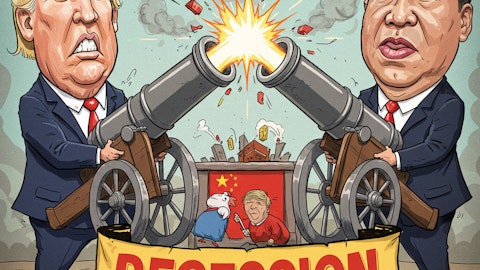2. Alphabet Inc (NASDAQ:GOOG)
Number of Hedge Fund Investors: 160
LikeFolio’s Landon Swan said in a latest program on Schwab Network that Alphabet Inc (NASDAQ:GOOG) is facing challenges when it comes to AI because people prefer to get instant answers to their questions from AI models, resulting in fewer clicks. The analyst shared some data that shows Google still surpasses other search destinations by wider margins, but the gap is narrowing fast.
“People, you know, when they want an answer to a question, they’ve discovered that Google gives you ads and people that are good at SEO, but maybe not the answer that you want, and GPT always gives you the answer that you want or at least it makes you feel that way. Sometimes it hallucinates, but what’s interesting is, you know, Google’s kind of got this problem where they started to adapt to that by putting an AI answer at the top, but that’s creating a click problem for them because when you go to Google and ask a question, you either get the answer that you’re looking for in the AI and you don’t need to click on something, which is what they need you to do. They need you to click on things so they can make money, or their AI didn’t answer it well enough, so you go somewhere else and leave them and go to GPT or somewhere else.
So they’ve got a tough situation here. However, as I always point out, they’ve got such a lead on the userbase side that if they can solve this problem, they’re good to go, and this is going to look like the steal of a century at $150.”
Alphabet’s search business is under threat from AI. However, its Gemini model has an edge over competitors because of the huge ecosystem Alphabet already has. For the end user, it’s easier to switch from traditional search to Gemini instead of moving to a completely new app like ChatGPT or Perplexity. So far, AI competition hasn’t dented the company’s search revenue.
In the fourth quarter, Alphabet’s operating margin rose 32%. YouTube ad revenue jumped 14% and Cloud revenue skyrocketed by 30.1%. Google raked in $12.8 billion in FCF, marking a roughly 215% growth compared to the same period last year, despite heavy investments in AI. The stock has a forward (2026) P/E ratio of 20.8x, which makes it about 22% cheaper than the average company in its sector.
The market has been ignoring Alphabet Inc (NASDAQ:GOOGL)’s key secondary businesses and the stock remains undervalued despite concerns around AI search and regulatory onslaught.
Alphabet Inc (NASDAQ:GOOGL)’s secondary ventures in AI, autonomous driving, and other areas are making solid progress, especially in the Waymo robotaxi segment. Waymo has shown notable progress. Waymo vehicles now average about 30.6 autonomous rides per day—substantially higher than Uber’s average of 4.18 rides per driver daily, based on Uber’s 31 million daily trips and 7.4 million drivers last quarter. This performance underscores Waymo’s competitive edge in autonomous ride volume compared to traditional ride-hailing.
Burke Wealth Management stated the following regarding Alphabet Inc. (NASDAQ:GOOG) in its Q4 2024 investor letter:
Alphabet: We parted ways with long-term holding Alphabet during the fourth quarter. We’ve owned Alphabet since the inception of the Focused Growth strategy so obviously, the company has many positive attributes that we admire. That remains the case. We have long contended that Google search is the best business in the world. However, developments over the past couple of years on the competitive front (generative AI search) and the regulatory/legal front have put the sustainability of Google’s search monopoly at legitimate risk for the first time since Microsoft launched Bing in 2009. We cut our weighting in Google in half last year as we wanted to take some time to better assess the threat of generative AI driven search to its business model. To be fair, this emerging threat has been something more akin to a gathering storm than a tornado. Capital continues to flow into the space both from start-ups and the Microsoft/Open AI collaboration. Thus far, this has not resulted in a material erosion of market share but it is certainly something requiring continued monitoring….” (Click here to read the full text)





